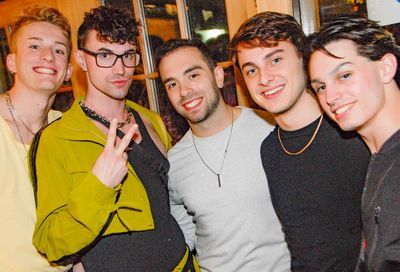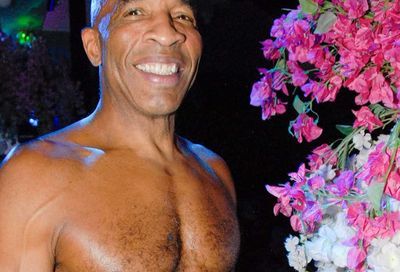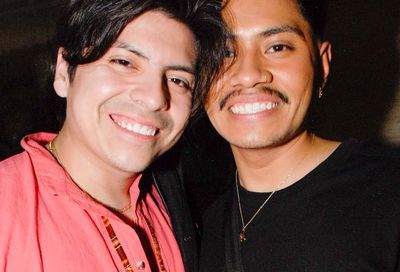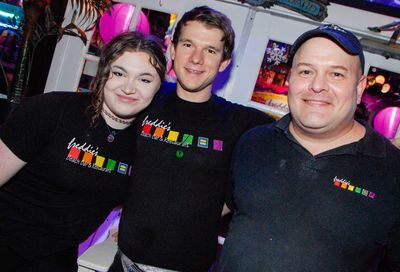Leaning Toward Justice
Tammy Baldwin on Gay History Month
In the 1960s, while confronting segregation, discrimination, obstruction of voting rights and physical violence, Dr. Martin Luther King Jr. often borrowed the words of another pastor, an abolitionist from Boston named Theodore Parker, to inspire and give strength to those in the civil-rights movement. In the fight for full equality, both Dr. King and Rev. Parker reminded their flock what I believe is equally true and relevant today as we discuss the gay rights movement in America: ”The arc of the moral universe is long…but it bends toward justice.”
You may wonder how I can say that in 2007, when LGBT Americans are still the victims of violent hate crimes and discrimination; still unable to serve openly in the armed forces; still unable, in many states, to adopt children; still unable in 49 states to marry; still denied the full and equal rights that citizenship grants and morality demands.
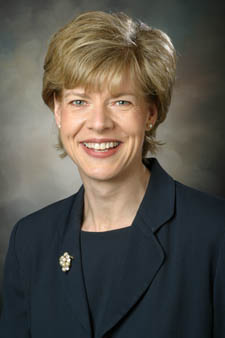 Tammy Baldwin |
Gay History Month is an appropriate time to step back from our daily struggles and frustrations to assess how much progress we have made in recent years. Despite political setbacks and sadly, still, hate crimes against the LGBT community, young Americans are growing up in ever-more tolerant times. Ten years ago, Ellen DeGeneres announced she was gay on national television and cynics predicted it would end her career. Earlier this year, Ellen hosted the Academy Awards where a billion viewers around the world were not only entertained by this openly-gay and hugely popular comedian, but then they heard Oscar-winner Melissa Etheridge publicly thank her own wife and their four children.
Today, you can go into almost any bookstore and find aisles of gay and lesbian literature. But one of my friends (now in his mid-’60) reminded me that when he was in college and beginning to question his own sexual orientation, the only mention of homosexuality came in textbooks next to adjectives such as ”deviant,” ”aberrant” and ”criminal.”
I grew up in the progressive city of Madison, in the birthplace of ”progressivism,” Wisconsin, and I had gone to one of the best public school systems in the country, yet no one had ever uttered the words gay or lesbian in a class. Never mind that there was no gay/straight student alliance or anything remotely like it. There were no openly gay characters on TV. No same-sex partners in advertising. No same sex marriage or civil union announcements in the society pages of the New York Times or any other newspaper. No protections against discrimination for LGBT people in housing or at work. At the time, not so long ago, ”queer” was a curse word and ”being queer” was a curse.
Well into the 20th century, our nation’s and the world’s history was never whole and truthful because the role of LGBT people in shaping that history was, quite simply, ”the greatest story never told.”
To some of you, the idea of a society so limited for LGBT people is as foreign as a world without cell phones, iPods or computers. But for those of you who remember the darkness and loneliness of life in the closet, those memories are still fresh and raw.
All of us who are openly gay are living and writing the history of our movement. We are no more — and no less — heroic than the suffragists and abolitionists of the 19th century; and the labor organizers, Freedom Riders, Stonewall demonstrators and environmentalists of the 20th century. We are ordinary people, living our lives, and trying as civil-rights activist Dorothy Cotton said, to ”fix what ain’t right” in our society.
LGBT Americans have far to go to achieve full acceptance or full equality, but we have witnessed a sea-change in societal attitudes toward gays and lesbians since my own days as a college student. And that change is being driven not in the legislature, but in our workplaces, our schools, our places of worship, and our communities.
All successful movements of change have much in common. They’re not as spontaneous as they may appear. Each involves citizenship training, grassroots organizing, advocacy and, most important, a faith that each of us can make a difference, and a faith that our democracy provides us with those tools.
And, yes, they take a long time. And sometimes we have to take a few steps back before we can again move forward.
But from the movements for civil rights, for suffrage, for trade unions, for environmental protections, we can learn the strategies and tactics, the patience and forbearance needed to achieve equal rights for LGBT Americans.
Above all, we can be sustained by the knowledge that, indeed, the arc of the moral universe is long, but it bends toward justice.
Representing Wisconsin’s 2nd Congressional District since 1999, Tammy Baldwin is the first out lesbian and the first openly gay non-incumbent ever elected to Congress.
Support Metro Weekly’s Journalism
These are challenging times for news organizations. And yet it’s crucial we stay active and provide vital resources and information to both our local readers and the world. So won’t you please take a moment and consider supporting Metro Weekly with a membership? For as little as $5 a month, you can help ensure Metro Weekly magazine and MetroWeekly.com remain free, viable resources as we provide the best, most diverse, culturally-resonant LGBTQ coverage in both the D.C. region and around the world. Memberships come with exclusive perks and discounts, your own personal digital delivery of each week’s magazine (and an archive), access to our Member's Lounge when it launches this fall, and exclusive members-only items like Metro Weekly Membership Mugs and Tote Bags! Check out all our membership levels here and please join us today!
















